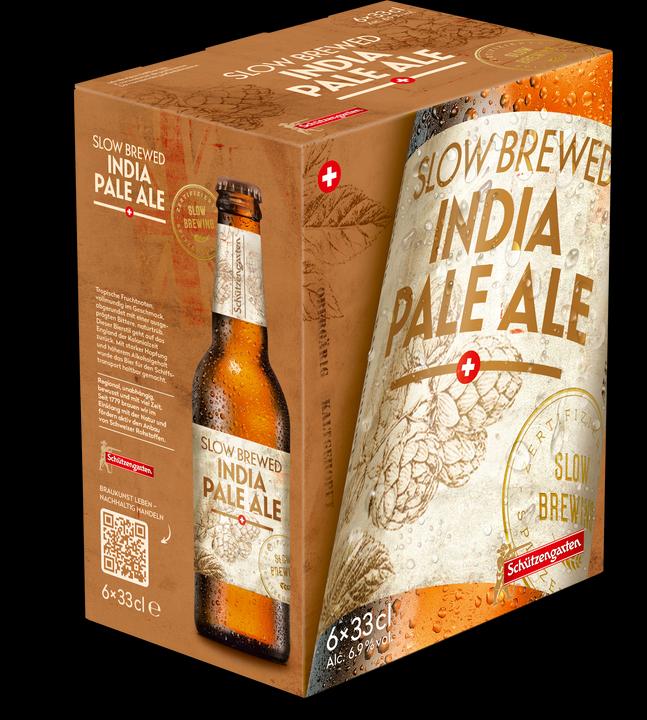
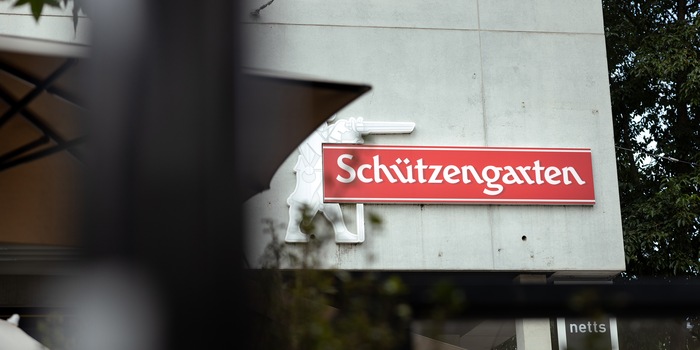
Good beer comes to those who wait
Being from Zurich, I mainly associate Schützengarten beer with events such as the blues’n’jazz festival in Rapperswil or the famous Olma trade fair. But I’ve never actually been to the 246-year-old brewery. High time to head to the heart of St. Gallen for my first tour of Switzerland’s oldest beer-brewing facility.
Before the tour, I checked out the German-language Schützengarten website and was amazed to find a vast range of products on offer. Feeling low on hops and urgently need a beer? There’s a courier who’ll deliver to your home. Looking for a fan club with 2,000 members? Check.
Or how about surprising someone with beers sporting customised labels? Sorted! Want to learn how to make beer like they did in the olden days? Then you should check out the annual «Hopferzupferfest» festival.
Into barrel-aged speciality beers? Here you go. More of a cocktail enthusiast and want to try your hand at creations involving beer? Try these recipes! Being a cocktail nut myself, that’s exactly what I did. Allow me to introduce the «Schüga Campari». The ingredients? One lager beer, Campari, ginger beer and lemon juice.
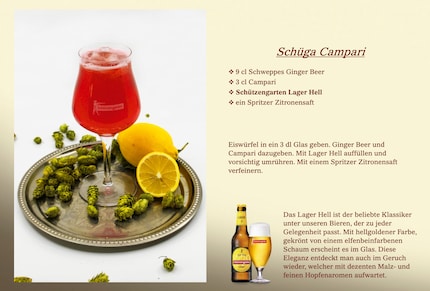
Source: Schützengarten
In a nutshell, Schützengarten was feeling like the Disneyland of Swiss beer to me before even visiting the brewery. Fast-forward to my visit and this impression only intensified. Just minutes into the tour, I was blown away by the bottle museum, which is also the meeting point. It’s an impressive collection of historic bottles from all parts of the country, from different breweries including some rarities with typos.
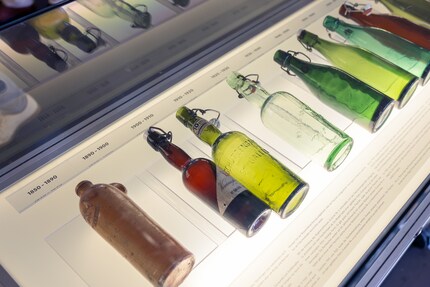
Source: Christian Walker
Shooting under the influence
Apart from all these clever marketing sideshows, good, honest brewing is clearly at the heart of the company. Schützengarten’s the only Swiss brewery to hold a slow brewing certificate and has done for ten years already. Earning this seal involves slow fermentation, gentle maturation, no subsequent dilution and the use of natural raw materials among other things. The slow brewing institute regularly audits both the company and the beer. Once a year, there’s also a major audit that includes 170 pages of forms Schützengarten needs to fill out, mystery shopping and the like.
I want to learn more about slow brewing and get in touch with the technical director, Richard Reinart, who’s on a hunting trip when I reach him. During the tour, I learned that the brewery shared its premises with a shooting club when it was founded. It seems the marksmen enjoyed the proximity to the brewery. I did, however, ask myself and Richard Reinart if it might be a bit irresponsible to get armed men drunk on beer. He laughs and says the shooting part would’ve taken place before the drinking.
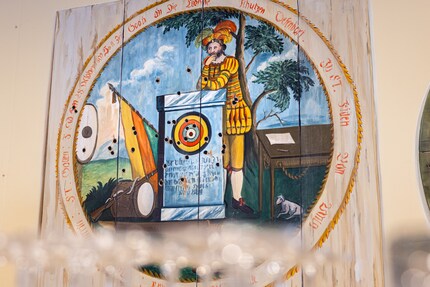
Source: Christian Walker
Slow brewing USP
Richard also tells me that a focus on quality also means keeping the fermentation temperature below 12 degrees Celsius so that fewer fusel oils are produced. Unlike Schützengarten, which takes two to three months to make the final product, lower-quality beers are brewed at higher temperatures, as this speeds up the fermentation process and results in beers that are ready in just one to two weeks.
What’s more, Schützengarten beer doesn’t contain any artificial enzymes or additives, which are sometimes used to quickly turn a light beer range into a dark one.
Sustainability is key
Thanks to its carbon dioxide recovery process, «Schüga», as it’s also lovingly called, had nothing to worry about when there was a gas shortage. Wherever possible, the brewery relies on local resources. As there are only a few small malthouses left in Switzerland that simply can’t meet their demand, Schützengarten gets its malt from Germany. Their own malthouse was discontinued in 1985.
In addition, Schützengarten also champions the use of reusable bottles as they have a lifecycle of up to 15 years. They already make up 60 per cent of all bottles used at the brewery. The spent grain, which is what’s left over after the brewing process, is turned into animal feed or used in the Lichtensteiger bakery to make beer bread. St. Gallen chef Rolf Caviezel also uses it to make «Klösti Gin».
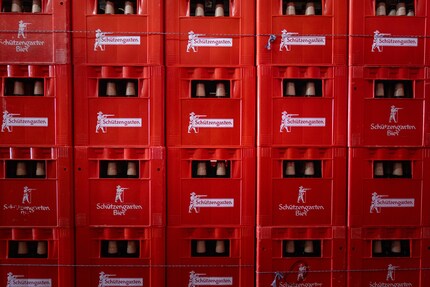
Source: Christian Walker
Schützengarten’s also self-sufficient in terms of energy. With its own solar panels and hydro stations powered by the river Sitter, the brewery produces so much electricity it can feed around half of it back into the public grid as surplus.
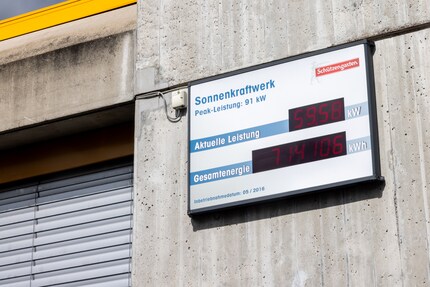
Source: Christian Walker
Brewery goes power producer
The hydroelectric power station has been there since the end of the 19th century. Back then, the beer company covered the costs of illuminating the city of St. Gallen. This wasn’t an entirely altruistic move, as it also meant more people would make the trip to have a beer or two.
Delivering to over 2,500 restaurants, 1,000 food outlets and 3,000 events, Schützengarten’s everywhere. I’m also seeing Schützengarten being advertised more and more in and around Zurich. The beers are also highly acclaimed, bagging an impressive 16 awards at last year’s World Beer Awards, for example. My favourite, Schützengarten’s IPA, even got gold at the European Beer Star awards.
Schützengarten is owned by the Kurer family, who live above the brewery. Speaking of living, another line of business of the brewery is real estate. The company has a large number of properties with a (leased) restaurant on the ground floor and affordable rental apartments above.
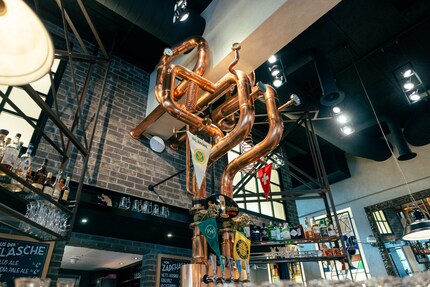
Source: Christian Walker
One of the things that impressed me during the factory tour was the robots. Their task is to check the bottles with cameras to see if they’re damaged or contaminated. Other robots rapidly move crates around the warehouse. Every now and then, a few crates go crashing to the floor. Whenever that happens, it’s employees instead of machines scurrying around to get the mess sorted.
Keeping the best for last
The tour ended with the bit I, and the other 16 participants, were looking forward to most: the beer tasting. I tried the Klosterbräu and the tasty Gallus 612, which is infused with juniper. What a way to quench my thirst!
Pretzels were served for this laid-back part of the tour. However, I avoided them to save my appetite for the in-house restaurant netts (page in German), where I treated myself to a dinner of homemade tagliolini with truffle cream sauce served in the beer garden. What a joy that was. If only all Mondays were like this.
I'm all ears for the dramatic! I love to get lost in a good book and am also a movie buff. Although most dogs are good dogs, I'm more of a cat person. Like them, I've got a mind of my own...
Interesting facts about products, behind-the-scenes looks at manufacturers and deep-dives on interesting people.
Show all
